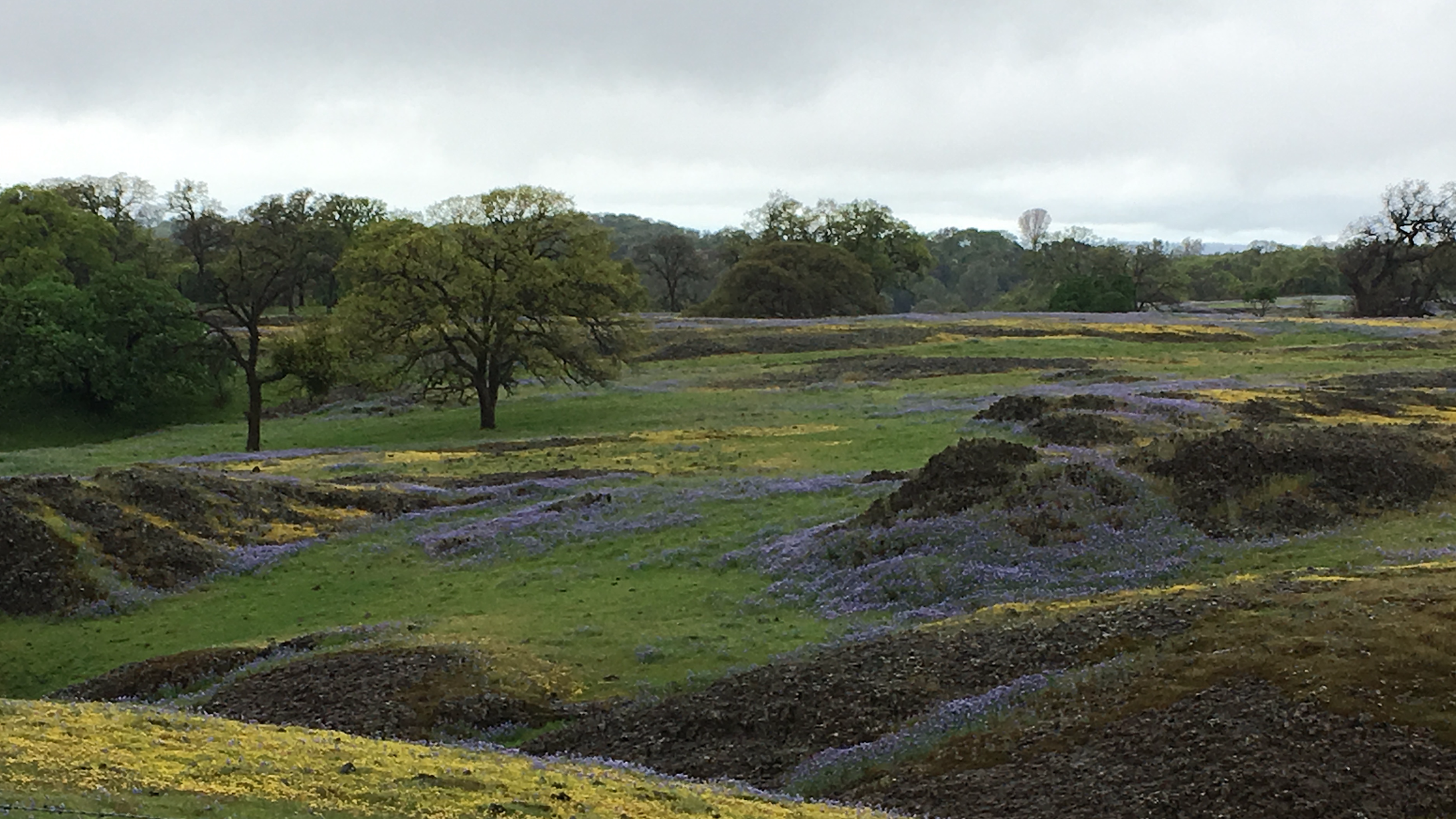I hadn’t been to Paradise in 20 years. Its reputation for antiques back then was the lure, though I don’t remember buying anything. Packing espresso, we drove the hour and a quarter down into the Sacramento Valley and then north, up some narrow roads into what’s left of the town, the roadsides and surrounding hills getting steadily blacker as we went. Your president called Paradise “Pleasure” when he visited after the fire, and that’s all I’m going to say about that. Some people’s hideously self-revealing mental bloopers do not need to be analyzed here.
It was worse than I expected. First of all, it still smelled like smoke six months after the fire was out. I don’t know how that’s even possible, given the rainy winter we’ve had. Smoke and pine, because there were dozens of huge yellow machines felling and chopping and stacking up pine trees everywhere, and trucks taking them away. We’d passed several big staging areas on the way in, which Sandy said were for the trees being removed, but again, I hadn’t understood the magnitude. I hadn’t understood anything. After we’d driven around for twenty minutes, looking at charred remnants of houses, gas stations, and banks, I almost asked her to stop the car so I could get out and throw up. The smell and the emotions together were a rough combo.
As more and more of our lives are experienced via screens instead of in person, I think it’s good to remember to go out and see things for ourselves when we can.

My town, Nevada City, appears on every top 10 list of the next locations likely to be hit by wildfire. We’re doing a lot of work to try to make things safer before fire season: we’ve even hired herds of goats to eat the brush between the trees. But it’s very hard to comprehend, when something is whole, how much of it will disappear after a big disaster. The human imagination does not easily dismantle the things it relies on for stability. Which is another reason everyone I know should go down and look at Paradise. Some buildings are still standing and look completely out of place. Many streets have only brick chimneys left to show where the houses once stood, chimneys that now look like gravestones.
Since it’s spring, daffodils had popped up in their usual spots, which made the scene better but also worse, for the stark contrast. Only recently had residents been allowed back in to deal with the remains of their lives. In some places people were still walking around in hazmat suits.

Sandy drove us past the Safeway, which only looks like a grocery store because there’s a line of carts out front all melted together. It could have been any big one-story building: a skating rink, a police station.
There’s a lot of social media hubbub about rebuilding Paradise. I don’t know how that’s going to work, I really don’t. Even the people who are okay have a hard time getting what they need from the shops they used to frequent. Either those are burned out or there aren’t enough customers left to support them as ongoing businesses, and they have to close. The people left in town have to drive much longer distances to get their supplies, and that makes it harder for them to stay. Paradise was a town of retirees, so multiply all this by the extra hardship of fixed incomes and limited mobility.
It was weird to drive around there, almost too intimate, as if we were looking closer into people’s lives than we should be.
Sandy said, “It does look bad, but it’s so much better than last month!” This made no sense, but she explained that a lot of the burned trees and telephone poles were gone, the wires cleared out, the wreckage of buildings already taken away. I don’t know where they take it. That’s another issue. I know 20,000 people have moved from Paradise to the nearby college town of Chico and rented all the apartments and houses there. Some are still living in tents because FEMA hasn’t come through yet. Some have rented up in our county and even farther away.
We stopped at a lunch place Sandy likes in Oroville, on the way home. The grass was green, the trees were leafing out in that electric way of theirs, meadows of blue and yellow wildflowers covered the hills. Your basic California spring gorgeousness. Here we are, I thought. We have enough money to buy lunch. We’re driving a car that runs, and we both have houses to go back to, even if mine is sort of a mess. Our local grocery stores are intact, and the movie theaters, the gas stations.
I’m hyper aware of what could be lost after seeing Paradise today, but how long will that last? How do people remember to be grateful for this stuff that just seems so ordinary, and not take it for granted?






